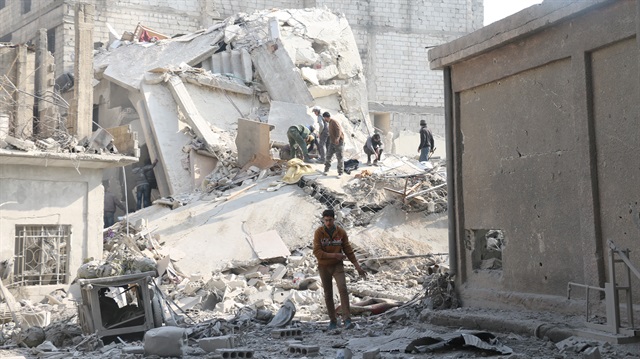

Syrians walk over wreckages of collapsed buildings after war crafts belonging to Assad Regime carried out airstrikes in the de-escalation zone of Hamouriyah, in besieged Eastern Ghouta in Damascus, Syria
Crippling siege has caused humanitarian crisis, with air and artillery attacks targeting residential areas, says UN
The UN on Tuesday warned about Syrian civilians suffering due to the upsurge in violence in Damascus’ besieged Eastern Ghouta enclave and in Idlib, northwest Syria.
"Since the end of last year, airstrikes have destroyed numerous civilian buildings, killing hundreds of people in both places and, in the case of Idlib, displacing some 100,000 people," the UN’s World Food Program (WFP) said in a statement.
- Idlib
"In Idlib, general insecurity has increased as armed clashes between government forces, their allies and opposition armed groups have intensified. Insecurity has also spread to parts of northeast Hama, western rural Aleppo and southern Idlib, forcing 100,000 people to abandon their homes near the frontline and move towards safer areas of Idlib governorate," the statement added.
Decrying the dire conditions in Idlib, the WFP said it had “pre-positioned over 27,000 ready-to-eat rations in Idlib and Aleppo in the event of a surge in humanitarian needs, and shipments of additional emergency supplies from Turkey are also ongoing."
Eastern Ghouta
"A crippling siege has caused a humanitarian crisis, air and artillery attacks have targeted residential areas" in Eastern Ghouta, the agency said.
Saying that early 400,000 people have been living in extremely difficult conditions, the WFP added: "Food shortages in the enclave have led to many cases of severe malnutrition with some residents resorting to eating animal fodder and rubbish."
According to the UN, some 417,000 people are currently living under siege in Syria, the vast majority of them in Eastern Ghouta, where almost 400,000 people live.
"WFP’s access to Eastern Ghouta has been severely restricted for the past five years, allowing only a trickle of aid to reach families in need," it said.
The WFP also appealed to all parties to protect civilians, respect humanitarian principles, and allow the safe delivery of food to families in need.
According to latest UN figures, 13.1 million people are in need of humanitarian assistance in Syria, some 6.5 million people in Syria are now food insecure, and 4 million people are at risk of becoming food insecure -- more than double the number at risk a year ago.
Some 6.1 million people are internally displaced and 3 million people are living in hard-to-reach and besieged areas, seven out of 10 people are in extreme poverty, basic food prices have risen 800 percent compared to the pre-crisis period, and there are 5.48 million Syrian refugees, according to the UN.
#Idlib
#Syria
#UN




